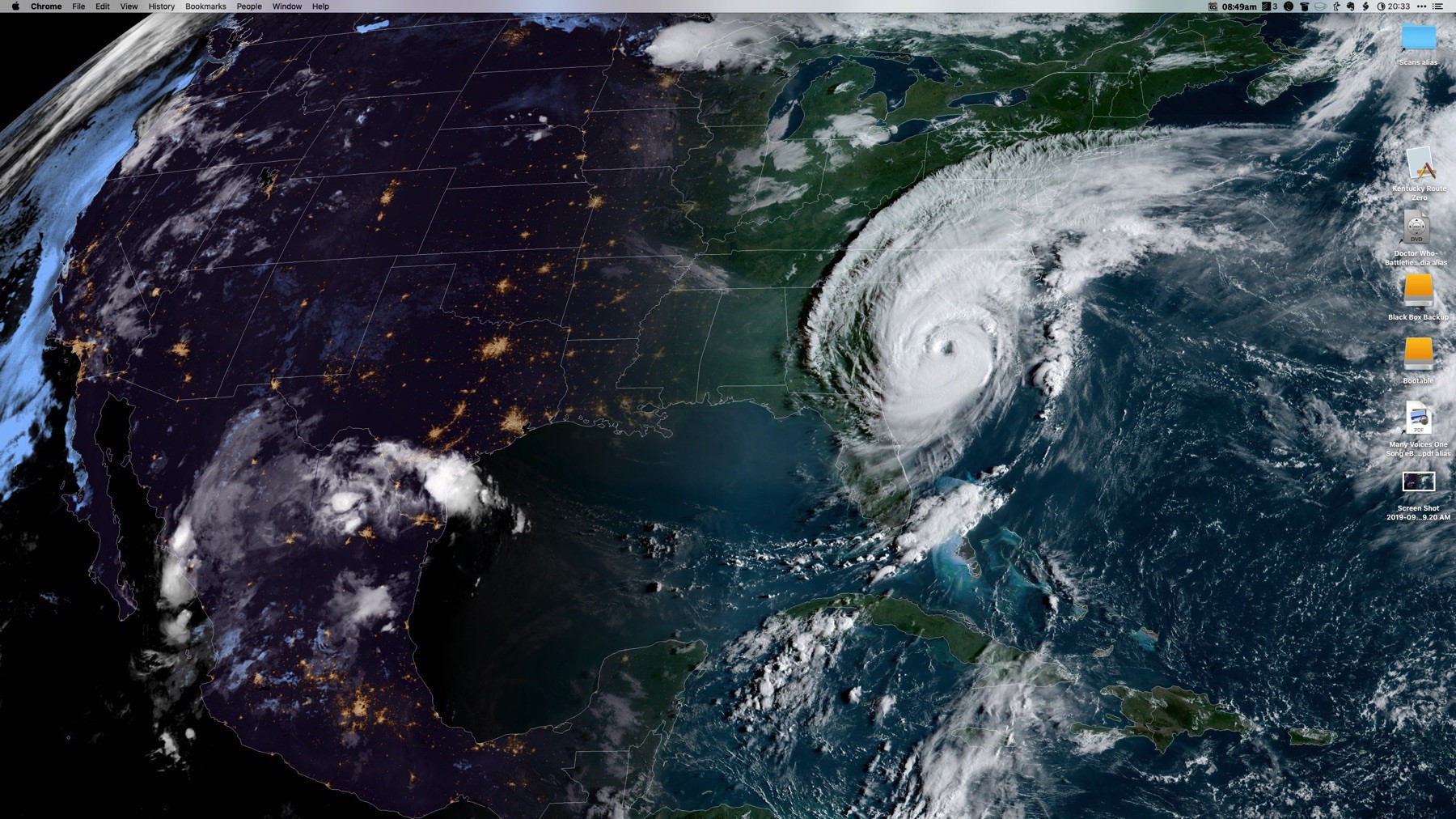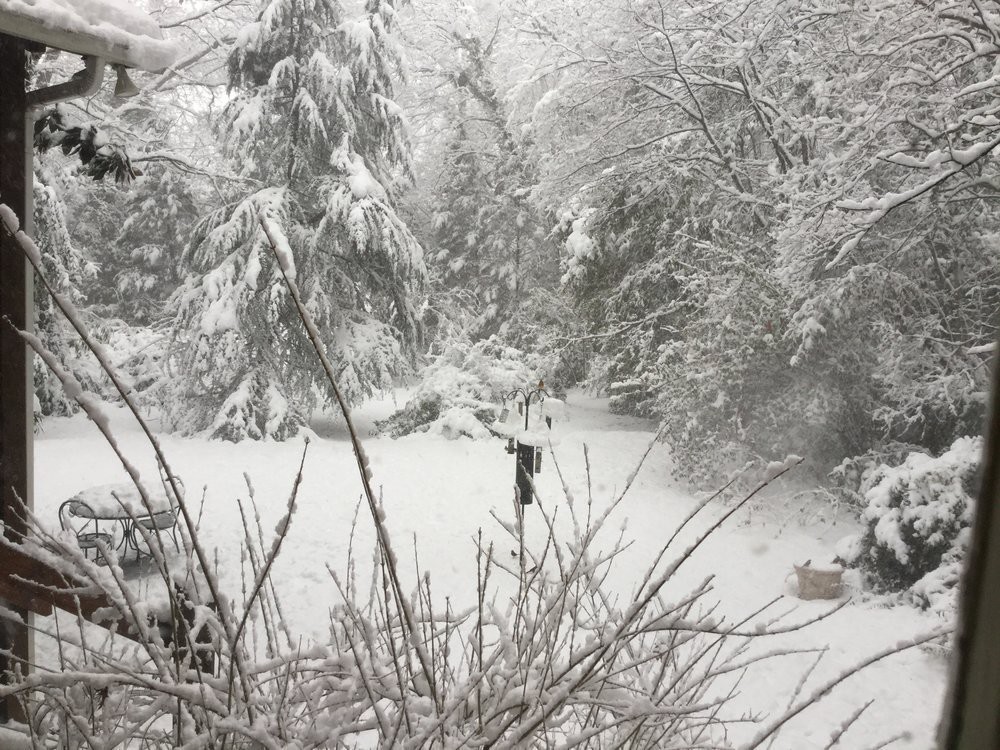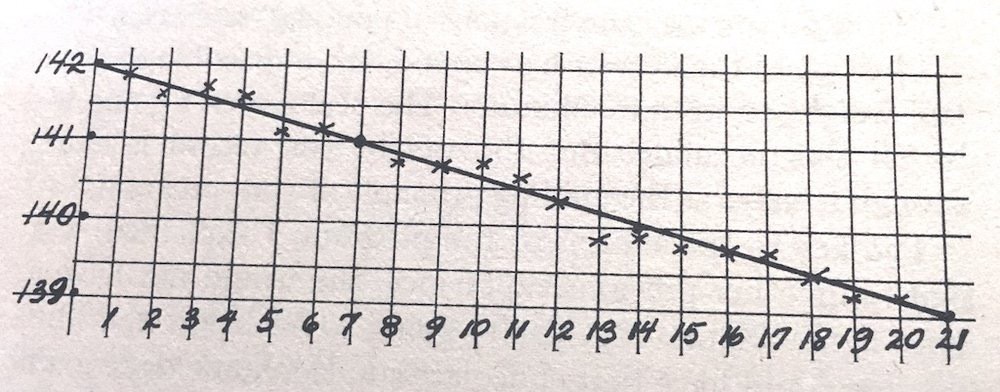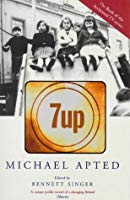Working at home today, awaiting the rains from Hurricane Dorian here in central NC. The coast has been evacuated. This screenshot is of my desktop; the photo is NASA satellite imagery from a Mac program called Downlink.

Working at home today, awaiting the rains from Hurricane Dorian here in central NC. The coast has been evacuated. This screenshot is of my desktop; the photo is NASA satellite imagery from a Mac program called Downlink.

Yesterday, I weighed 210.2, about a pound under my control line. This morning, I weighed 211.8, about a pound above my control line.
I could attribute the increase to a bigger than usual lunch, a supper of starchy leftovers, trying to lose weight in the winter is a mug's game, the dates I snacked on in the afternoon (if grapes=candy, then dates=chocolate caramels), a week of consistently poor sleep, or 104 other variables.
No matter the cause, I have to take the scale’s report as truth and act accordingly.
Mark Forster, when he devised his version of the No S diet, defined a set of rules for such occasions. Every day he was over the line, he added a rule. Every day he was on the line, he kept the same rules. Every day he was below the line, he relaxed a rule.
It’s an eminently sensible plan.
I started defining my own set of rules, ranking them by severity, etc. but decided to go easy on myself. I have my own toolkit of techniques; as I mark my weight on the graph, I’m already calculating which ones I will deploy that day.
The techniques are a mix of the following, in no particular order, and as the day allows:
Today, I had 3 meals (cold boiled potatoes at lunch), small portions, no snacks, and walked the parking lot at work. I did have a cider.
If my weight is still over the line tomorrow, then I will aim to have my large meal about midday. I’m scheduled for a workout, so that will help burn some calories. For the rest of the day: eat less, move more.
Although trying to lose weight during winter is like pushing a car out of a ditch.
Update, 1/27/2018: I weighed 209.8 this morning, a little less than a pound under my control line. Success! The goal today is to eat sensibly, have a workout, and continue to stay on or under the line.
Durham NC got about 8-11 inches of snow today. Here’s a shot from our backyard (taken by Liz) this afternoon and from our front porch this evening.


The key tool for me will be a weight-tracking chart made with pen and graph paper.
The chart format is described in the 1975 book Total Fitness in 30 Minutes a Week by Laurence E. Morehouse and Leonard Gross (long out of print). I first heard of this book through Mark Forster’s article.
The goal of the chart is to help you track losing a pound a week. This is a sustainable and non-superhuman rate of loss that should, we hope, prevent feelings of deprivation and will-power stuggles.
Here’s how Morehouse presents the graph in his book:

That line determines your weight control program. My graph runs from 1/13 to 2/20, about 5 weeks. Every day I weigh myself, my weight will be above, below, or on the control line. For fractions of a pound, round up or down to the nearest half-pound.
Morehouse describes the protocol:
Morehouse makes the point that your daily weight will of course fluctuate for any number of reasons; some we can control, some we cannot. But for the purposes of this exercise, treat the weight as true and adjust accordingly. As Morehouse says,
We pay attention to the scale, particularly since it’s such a good source of motivation, but we don’t take it too seriously.
If you’re above the line for several days in a row, then it ain’t the weather; do what you need to do to bring your weight below the line. But if you're below the line, hooray! Take advantage of the fluctuation.
Keep tracking your weight in this way till you reach your target weight. In my case I’d like to be 195 lbs. So, if all goes well, I’ll get there sometime in mid-May.
There are spreadsheets out there (the Hacker’s Diet being one) that track one’s weight daily and smoothe out the fluctuations. And any app store is lousy with weight trackers.
So why use pen and paper? For one thing, I like looking at the chart and seeing how long this will take. It reminds me that sustainable weight loss is a slow process – slower than I’d like, frankly. But whenever I’ve tried to lose faster than this, I would rebound to some degree.
Making the chart involves me in the process and updating it every morning is also more active than simply typing my weight into an app. When I record the weight and note its position relative to the control line, I immediately begin planning my day’s eating and activities.
What do I do when I’m over the line? When I figure it out myself, I will post it here!
In all the year-end roundups on the various blogs, I enjoyed David Cain's 16 things I know are true but haven’t quite learned yet. I already knew and practice #2 but several, like #s 1, 3, and 6 -- I still struggle with those. (But substitute MacBook for smartphone.) It made me think of a few things I know that I am still learning are true for me.
Taking a leaf from Havi’s Friday Chicken, this post will review the semester just past, but with a few additional headings.
I recently finished a pretty big, for me, literature review that totaled about 17 pages, including the title page and two pages of references. Here are some scattered thoughts and lessons learned, at my customarily hideous length:
[1] Many and many a year ago I worked in one of the tech-writing gulags of Northern Telecom. A young Southern lady who managed the Interleaf publishing resources often told us about the templates and files stored in the "liberry." Sorry, but that pronunciation just stuck in my head and I don't want it to leave.
[2] Lori says I should get used to this.

Since our 780 Research Methods class doesn’t have a Blackboard site for the class, I’ll post my various links and thoughts to the blog, tagged with “780.”
What I admire about Seth Roberts is his abundant idea-generation and his zeal for measurement and record-keeping. His goal is to experiment on himself first, then if his data indicates that there are possibly interesting results, then he proceeds with more methodical testing and inquiry, possibly leading to more formalized studies (or not).
When I’ve been thinking about possible studies I might like to try, I remember this quote from one of his blog posts:
SR: Tell me something you've learned about research design.
BW: When I was a graduate student [at the Stanford Business School], I would jog on the school track. One day on the track I met a professor who had recently gotten tenure. He had only published three articles (maybe he had 700 in the pipeline), so his getting tenure surprised me. I asked him: What's the secret? What was so great about those three papers? His answer was two words: "Cool data." Ever since then I've tried to collect cool data. Not attitude surveys, which are really common in my area. Cool data is not always the easiest data to collect but it is data that gets buzz, that people talk about.
Thinking about what “cool data” might mean in a digital curation or archival or info-science context can be tough. I think the social networks are certainly perceived as cool and you can do cool stuff with them, certainly, but I’m not that curious about them. I feel like, were I to study one of them, I’d just be chasing a parade that’s got a five-mile headstart. Better to find my own parade. :)
Curiosity is probably what drives me. Certainly, one of the itches that a researcher must scratch is his or her own personal obsession with some nagging question or detail that no one has really addressed or answered to their satisfaction. (The same way most writers have to write their own poems, stories, and plays, because no one else is publishing what they want to read.)
Check out his numerous posts tagged scientific method (though he’s more usually critical of scientists’ behavior than the method itself) and self-experimentation for more.
Instead of this negative critical thinking, I like his suggested questions to ask instead, especially the simplicity of his fifth question: “What’s interesting or enjoyable about it?” Even if I find the writing of an article stilted or atrocious, I think it should be possible to at least admire a piece’s energy, its intent, its point of view, its ability to stir thoughts in me, etc. Saying something constructive is not about becoming a positive-thinking ninny; it's about seeing more sides of the issue than only one.
Even for a piece (Mabry's "Reference Interview as Partnership") that didn’t really touch me, I appreciated that this was the author's distillation of a career’s worth of lessons that she wanted to impart. In my summary of the piece, I said I could see it being used to start a conversation about one’s own personal manifesto for serving at a reference desk. We’re not often asked to reflect on our larger purpose or philosophy when it comes to our jobs, or even our career, so I saw the Mabry piece as a terrific starting point for such a conversation.
Inspired by Rani’s post about her upcoming work (hope that’s going well for you, Rani), it’s probably a good idea for me to look at the months ahead.
I was not terribly interested in the spring courses being offered, and The Ineluctable Cassidy suggested an independent study might be an option.
I poked around and discovered that another friend, Carolyn, could supervise it. Because Carolyn is a doc student of some years standing in the school’s digital curation discipline, knowledgeable, energetic, and incredibly savvy about making the most of opportunities, this is a tremendous way to jump-start an academic career. I hope to learn as much about how she looks at life and work as I do about digital curation.
Anyway, she is an excellent guide to this strange new world of academe and to this field. We decided to work on a research study and she sent me several links to follow up on, read, and think about; suggested I start a research journal; and asked me to suggest some possible areas of interest where we could do some work. The output will be an article, or paper, or poster, or something that can be put on a CV.
This research was, in fact, another drain on my attention as I tried to finish up my fall assignments. I barfed out some ideas an in email to Carolyn but they struck me as too big, too vague--showing, no doubt, my unfamiliarity with the field. No matter. That’s why I’m doing the research.
When January comes, I’ll be taking the Research Methods course and the independent study. We decided the indie study should count for 3 hours credit, which means about 9 hours/wk of work. Because I’m not having to travel to campus for this extra class, I expect that should fit into my schedule OK.
Update, 11-Jan-2008: All reference letters were submitted. All transcripts have been sent to the gradschool and the SILS office. All over now, but the waiting.
Follow-up to my fall break posting.
Anthonio. In sooth I know not why I am so sad, It wearies me: you say it wearies you; But how I caught it, found it, or came by it, What stuffe 'tis made of, whereof it is borne, I am to learne: and such a Want-wit sadnesse makes of me, That I have much ado to know my self.
(Merchant of Venice, Act 1, Scene 1)
OK, OK, it's not that bad. I dramatize. I soliloquize. But that lament pretty much reflects my state of mind for most of August and into September, where I had a storm in my head as I debated why I was in school and what I wanted out of it. It was all I could think of or talk about, and I look back at myself now and wonder at the mental and emotional fits I was giving myself. I'm sure I became a bit of a bore to my friends as this topic drove other more earthly concerns out of the limited crawlspace that is my head.
Ever since I started grad school, I've collected various links in my delicious account tagged gradschool and academic. I've been bemused by the number of writers who describe the PhD experience as depressing, dispiriting, a slog, something to be managed rigorously or die, etc. (Maybe only the folks who really hated the experience blogged about it?) At the very least, it's a serious business. Here are links to what I mean:
Now, to be fair, the advice most of these folks have runs along the same lines and it sounds pretty sensible: Know what you want and why you're there. You're on your own. Be focused. The job market is tough and getting tougher. Manage your adviser. Be prepared to be frustrated.
The first person who suggested the idea to me was a professor from Spring 2007, who ended his email with, "Stop laughing! I'm serious!"
My mentor, The Indefatigable Cassidy, makes it a point to bring it up in conversation at least once a semester and she has promised to step up that cycle as time goes on.
And when I mention the idea to peers at the school or even to civilians, their response is very positive. (See my earlier post on hallway conversations.) My social reality is echoing back to me, with a puzzled expression on its face, "I thought you were already a doc student. It suits you." For whatever reason -- my posture, my insane good looks, my carelessly thrown together wardrobe -- I give off the doctoral vibe like cheap aftershave. So maybe the folks around me know something about me that I don't.
But ever since I've started grad school, my reply has been a firm "No." The PhD involves work and activity far beyond what I thought I wanted to or could do, beyond what I thought I wanted out of a degree, and beyond my chosen performance level. Why make life harder by investing immense hours and energies for what may be only marginal value? Why bang my head against an ivory wall for 5 years and then face the cold cruel world of academic careerdom, where my previous 20+ years of workforce experience would add little to my reputation?
Some of my friends and advisers are saying, "You think too much. Just do it." That's a valid point. But I do feel I have a little more to lose by doing a PhD now than in, say, my 20s or 30s. Apart from the monetary loss, there is less time to make a course correction if I make the wrong bet.
I have many reasons why I should say "Yes."
Why am I hesitating?
One of my advisors (I have an informal board of advisors -- friends who I can talk to about serious decisions and who provide a range of valuable advice on these matters) said to take the opportunity, hide out in academe while the economy sorts itself out, and get started on the next phase of my life.
There is also the feeling that the wave is cresting. I need to ride this wave while it's building and let its energy sweep me along. I need to trust that the resources I need will be there when I need them.
That said -- why do I not feel excited? This scenario is what I was welcoming 18 months from now -- why is it not so welcoming today? Because I feel I'm not ready? Because it seems too big of a step? Because because because...
Thinking too much! The curse of the late-night intellectual...
Update: Hill reminds me of something I should add: I have absolutely no illusions that the academy offers a workplace that's any different from the workplaces I've experienced over the last 25 years. There will be different stressors, friendly and difficult personalities, arbitrary authority to answer to, etc. I've worked as a staff member at both a small and a large college, and when you pass through the veil from student to staff (and faculty are staff, in my opinion), you start seeing a lot of activity that was hidden from view, rather like the way Disneyworld elves surreptitiously clean up after you on Main Street.
As Hill reminds me, the sooner I kill the romantic illusions that academe fosters, the more I'll benefit from what the experience can offer.
Update: "Just because you can do something doesn't mean you have to do it." Also: "Ride the horse in the direction it's going."
Update: (You know, at some point, I should just start a new post...) NCSU (my alma mater -- LWE, 1983) offers some juicy graduate programs through its College of Humanities and Social Sciences , especially this one, which looks quite exciting. This is one I should investigate, simply on its own merits.
I meant to add this time management rule to my previous Fall Review post. I can't remember whether it originated with Mark Forster or David Allen, but it goes something like this: At all costs, avoid heroic efforts to get things done. Examples of an heroic effort would be pulling an all-nighter or shoving all other obligations to the side to totally focus on The One Project that needs to be done by tomorrow morning at 9 a.m. As I said in the Fall Review, yes, some projects do need hours of uninterrupted time so you can make progress. But I think the ideal is that you plan that work well ahead of time -- staging its component pieces in the days leading up to it -- so that you can approach the work or project mindfully rather than in a panic. And, so you can leave your desk at a decent hour feeling that you're on top of things and get a good night's sleep.
Forster's "little and often" and "continuous revision" rules can help here if you start early enough and if you're consistent in applying them.
Unfortunately, because I had not used my time wisely on Sunday (I chose to work on a project whose deadline was further out and I underestimated how much time the looming project actually needed), I had to launch an heroic effort on Wednesday to meet a Thursday deadline. This effort took 8 solid hours of time and attention and I was left quite depleted afterwards. And it's the aftereffects, the post-partum hangover, from an heroic effort that must be avoided. It can take a while for your tanks to refill; in the meantime, other projects are backing up.
During 2007's fall break, I took a breather and penned (odd word for a blog post, but I'll use it) an update on how the semester was going and the changes I was going through at that time.
A question from Brother Thomas and my friend Rani's firing up of her own blog about her academic struggles and successes compelled me to do another mini-review of how the semester is going. So, some random thoughts in random order:
Here's the regular daily 'scope:
People are more impressed by your efficiency than by your eagerness to please. You need to back up your smiles with an authentic performance. Additional diplomacy must be carried in your toolbox.
Here's usually the most interesting part of the daily 'scope. Let's make a date to check it next year, shall we?
If September 24 is your birthday: You currently have a good grip on how to succeed in business without really trying. By the end of October you could be distracted by a romantic hope or tempted to engage in a wild-goose chase. Wait until December or early January to make crucial decisions, changes, or to begin important undertakings.
Liz clipped out last year's birthday horoscope and placed it under my desk mat. Here's what it said:
If you were born September 24: Patience is your friend. Bide your time and don't initiate anything of great importance, such as a mortgage or marriage, before December. You are highly ambitious this year, but must not burn any significant bridges or rush too quickly into new projects. A romantic encounter could have you humming love songs in January and February. Your deep passion for success might be advantageous during April.
My friend Rani left me the following intriguing comment:
Mike - would love to know how the life/school/work balance (or juggle rather) is going. Have you been able to obtain equilibrium at all? What about nirvana?
I was going to reply as a blog post that night but spent too much time working on an assignment. (Cue the irony strings.) I wish I had something pithy to impart, as I have no coherent thoughts on this, so I'm afraid I bejabbered a long and rambling discourse to her in an email. But this is what I do, so we must perforce accept what we do not wish to change since it has worked pretty well for us so far.
Anyway, I've taken that long and rambling discourse to her and tried to pull out the nuggets to create a letter to myself. If anything, it's a snapshot of where I am today.
Funnily enough, I'm not paralyzed with fear and anxiety. Instead, I'm looking at it all rather coolly (if a little frazzledly) and calculating when I have time to get things done, what's the highest priority, where can I slack off, when can I sleep late, etc. I turned in an assignment a week early so I could work unfettered on the assignment for my other class, focus on my work projects, and free up an evening so Liz and I could attend a concert (meaning, no homework time that night!).
That kind of thing. Starting early, giving myself time.
Also, Liz was there before the degree, Liz will be there after the degree. Praise be to the Liz.
Rachael in the elevator: "So, Mike, are you going to do a doctorate?" Dr. Tibbo as she was leaving her office: "So, Mike, has Carolyn talked to you about joining the doctoral program?"
Well, sort of. I wrote earlier about retiring from the field when I found the story I was working on uncongenial. But I couldn’t get some of the images out of my mind, and I had certain key moments in the long life of the main character appear in front of me as I went about my other chores.
I had also promised myself the New Yorker DVD set if I successfully completed nanowrimo. While I always intended to buy the set anyway, I can’t forget that carrot I dangled in front of myself. I felt I needed to put in at least a good-faith effort in order to justify buying the DVDs.
So I went back to my file and basically started the story over again for at least the third time. It’s interesting to me how the story started as a sprawling, dozens-of-characters murder mystery, to a more constrained, cozier setting, starting with two characters but in the last few writing sessions, settling on the main character, a 96-year-old woman on her deathbed remembering key events of her life.
I don’t believe I’ll make the 50K word count by Nov. 30, though. I’m at about 23,700 right now and can’t do much more than 2000 words in a sitting. The week I took off left me way behind, and I went to bed early last night. So I’d need to push out about 3000+ words a day to make the goal. Hm. Well, maybe if I intersperse writing sessions with leaf-raking on my days off Friday and Saturday, maybe I’ll get up to the mid-30s by the 28th.
I was looking forward to it this year, but hit the sand early and never recovered. I started out as I had done last year, with an image, a situation, and then started to run with it. But the material didn’t form under my fingers as naturally as last year. I finally switched from a male, first-person narrator to a female, third-person narrator, and that helped a bit. I got several days of writing out of that.
I also adopted the Jeanette Winterson/Diana Gabaldon method of composing scenes out of sequence, thinking that if I could get the juicy scenes out first, then that would give my mind time to generate the connective tissue.
Well, it’s a good idea, and I should try it sometime. But tonight I sat at the keyboard and the ideas just didn’t come. I think the past that one of the main characters, a 96-year-old rural woman, on her deathbed, has lots of sadness and compromise in store for her, and I plain don’t want to go there. I don’t want to put her through it. There’s also the niggling feeling that I’ve read this kind of story before, that I’m just going through the plotting motions, and the sense of discovery I had last year isn’t there.
There have been pleasant surprises along the way, and I’ve rediscovered the truth that 50% of the material I generate will come out of the writing and I don’t need to do much in the way of planning. I did hit on some interesting connections in some of my daily writing, and some haunting (I think) images that I will want to come back to.
But as for making the 50,000-word count by Nov. 30 – nope. I’m bowing out. Nanowrimo should be fun, for me, and I don’t need the extra pressure of generating plot and words for a story that I am resisting. I reserve the right to continue to play with the story through the rest of the month (and beyond), however, and may break through whatever I’m resisting. But not today.
Yes, I’m one of the hairpins doing the NaNoWriMo challenge, though I will only use lowercase letters from here on out because those intercapitalizations drive me nuts.
Last year, I signed up on October 31st, just for a lark. I wasn’t working, nothing was going on, and I thought it would help me pass the time. I emailed my friend Sue in California, also a writer, and said this looked like fun, I may try out. Well, she signed up too. I got the No Plot, No Problem book, read through it, and plucked out a situation I’d written down in my notebook years ago but had never done anything with. I didn’t know where it might go, but thought I’d give it a try.
It had a magical, fantasy type atmosphere, and I read a couple of Lon Milo DuQuette’s books that helped feed my imagination during the process.
I wound up creating enough situations and piling up enough detail that I eventually “won” with about 51,000 words. Sue actually crossed the finish line first and called to tell me. This inspired me to sit down, finish mine, and upload it to the site (which I did before her). We were both abuzz for the rest of the year, comparing notes on the experience, and patting each other (and ourselves) on the back for taking on a crazy project (crazier in her case, as she’s a freelancer and mother of two little girls) and actually succeeding at it.
The lessons I learned and things I noticed: